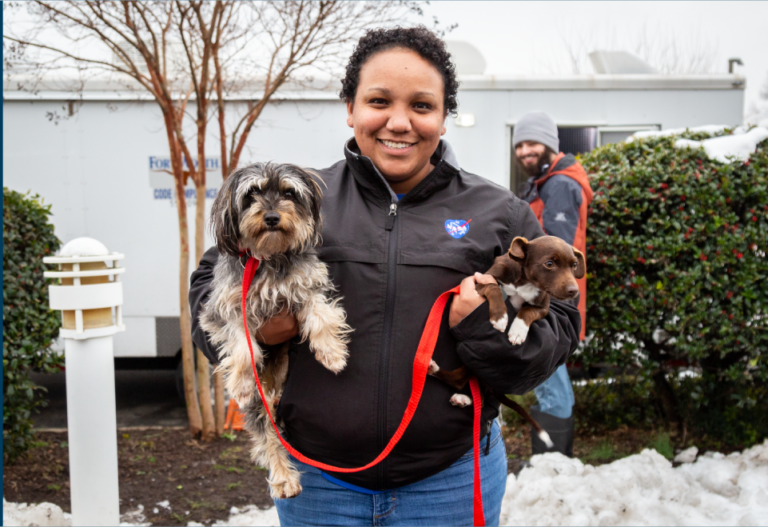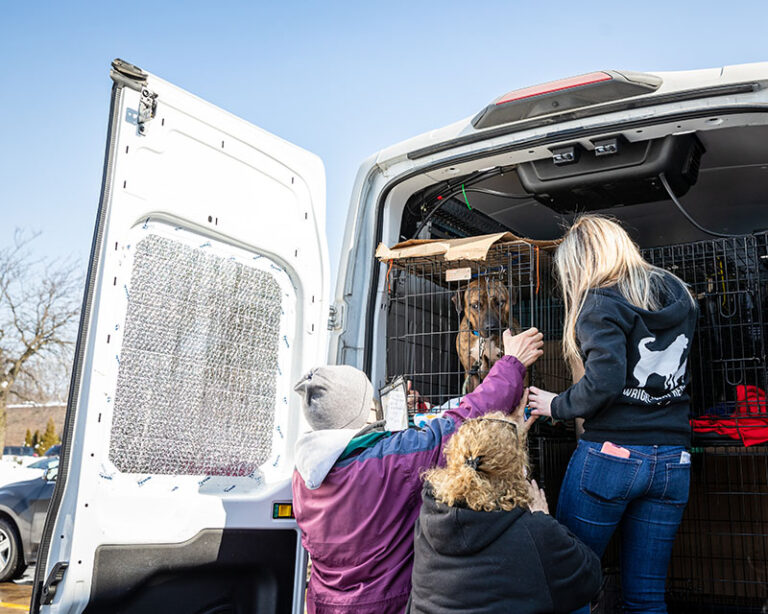Intakes have overtaken positive outcomes for shelter pets. With summer coming, the need to increase accessibility and remove barriers to pets going into homes only grows more urgent.
We’re diving in over the next few months to see what data and research can tell us about ways to move shelter pets to adoptions more quickly—beginning with this blog on the research supporting fee-waived adoptions.
Shelter operations should utilize rapid intake to placement procedures to support pets leaving the shelter as soon as possible and reduce lengths of stay. Fee-waived adoptions provide one important, effective solution—with the evidence showing pets adopted without fees are just as loved, valued, and cared for as those adopted with fees in place.
Here’s What the Research Says on Fee-Waived Adoptions
The animal welfare industry has known for quite some time that fee-waived adoptions offer many benefits for shelter pets and do not compromise adopter-pet attachment or pet care quality.
In fact we’ve known for so long that the scope of modern research has progressed beyond this particular question, instead turning to investigate issues in animal welfare that aren’t yet so settled. That’s why you’ll find that most of the research below was conducted some time ago—because researchers have moved on to topics they believe still represent open questions.
Below you’ll find the foundational research studies on the topic of fee-waived adoptions. We’ve included links, a brief summary of what question the research was seeking to answer, and major findings:
Outcome of Pets Adopted During a Waived-Fee Adoption Event: Maddie’s Matchmaker Adoptathon
The University of Florida’s Maddie’s Shelter Medicine program distributed a survey to adopters following a fee-waived adoption event in the San Francisco Bay Area to assess outcomes for the adopted cats and dogs.
Key findings:
- The majority of pets adopted with waived fees remained in their homes.
- Adopters reported high attachment levels to their pets.
- The pets’ quality of life was not compromised—with most pets living indoors, sleeping in the family bed, and going to the vet.
Why Shelters Should Waive Cat Adoption Fees
The ASPCA surveyed cat adopters following six fee-waived adoption events. The data collected for fee-waived adoptions was directly compared to data from non-fee-waived adoptions.
Key findings:
- Most pets received veterinary care after their adoption, regardless of whether their adopter paid an adoption fee.
- Cats whose adoption fees were waived were just as likely to remain in their homes as cats whose adoption fees were not waived.
- Cats whose adoption fees were waived were valued by their adopters.
- Waiving fees led to a 50% increase in cat adoptions.
A Comparison of Attachment Levels of Adopters of Cats: Fee-Based Adoptions Versus Free Adoptions
Researchers investigated the attachment of adopters to their cats when adoption fees were waived and when they were not waived.
Key findings:
- Attachment to adopted cats remained the same when fees were waived.
- Cats were not devalued when their adoption fee was waived.
- Fee-waived adoption programs offer positive solutions for shelter cats.
Here is some related research on adopter behavior and preferences, as well:
Do Policy Based Adoptions Increase the Care a Pet Receives? An Exploration of a Shift to Conversation Based Adoptions at One Shelter
Adopters from a humane society were surveyed following adoption. One group participated in an accessible, barrier-free process and the other participated in a process with strict policies and barriers in place.
Key findings:
- Those who adopted pets through accessible, no-barrier programs were just as likely to provide quality care to their pet as those who adopted through processes with strict policies in place.
- Those who adopted pets through accessible, barrier-free programs were just as likely to be bonded to their pet as those who adopted through processes with strict policies in place.
Why Did You Choose This Pet?: Adopters and Pet Selection Preferences in Five Animal Shelters in the United States
The ASPCA surveyed adopters from five open-admission shelters that provide field services in the United States. The research investigated adopter preferences when selecting a pet for adoption.
Key findings:
- Physical appearance, social behavior toward the adopter, and personality were the primary reasons an adopter selected a pet.
To sum up, fee-waived adoptions can benefit your organization by reducing pet length of stay and increasing accessibility to adoption for your community. Rest assured that research says pets adopted through fee-waived programs are equally loved and cared for as those adopted with fees.
Still not quite convinced? Consider a pilot test approach where adoption fees are waived during a stand-alone event or for pets experiencing extended lengths of stay.
Track and evaluate data, such as adoption rates, return rates, and length of stay at your organization to identify opportunities where fee-waived adoptions were an effective intervention for the pets in your care.
Once You’re Ready to Try Waiving Fees, Check out These Campaigns for Inspiration
Borrow inspiration for your organization’s fee-waived adoption promotions here:
- This social media post by Austin Pets Alive!, about a fee-waived adoption event with the Austin Animal Center and the Austin Humane Society. We like that this post gives a specific number of pets (300) the event is hoping to place in homes.
- Baltimore Animal Rescue & Care Shelter has a whole page of their website devoted to adoption packages—including those that are fee-waived. It’s very helpful and easy to understand.
- This social media banner by Dallas Animal Services couldn’t be clearer in its messaging: Free Adoptions.
- Here’s a more in-depth social media post by Greenville County Animal Care that includes why they are waiving adoption fees—because the shelter is full—and offers ways that members of the community can help even beyond adoption.
- KC Pet Project’s web page about a Waived Fee Wednesdays adoption promotion has all the information an adopter would need to know—and a link to the adoptable dogs. LifeLine Animal Project is running a similar promo—with similarly great alliteration: Free Dog Fridays! Here’s a clear, simple social media post about the special.
We want to hear from you! How have fee-waived adoptions helped your shelter’s adoption efforts? What questions do you have about launching a promotion or program of your own? What does your data show about this lifesaving intervention in your community?
Contact the Human Animal Support Services team at hass-project@americanpetsalive.org!
Heather Kalman is the Research and Development Data Coordinator for the Human Animal Support Services project. Heather is a certified professional dog trainer (CPDT-KA; ABCDT) and shelter behavior affiliate (IAABC-SBA), who has worked in animal welfare for over 11 years as a canine behavior consultant, shelter behavior and training manager, and shelter operations manager.






